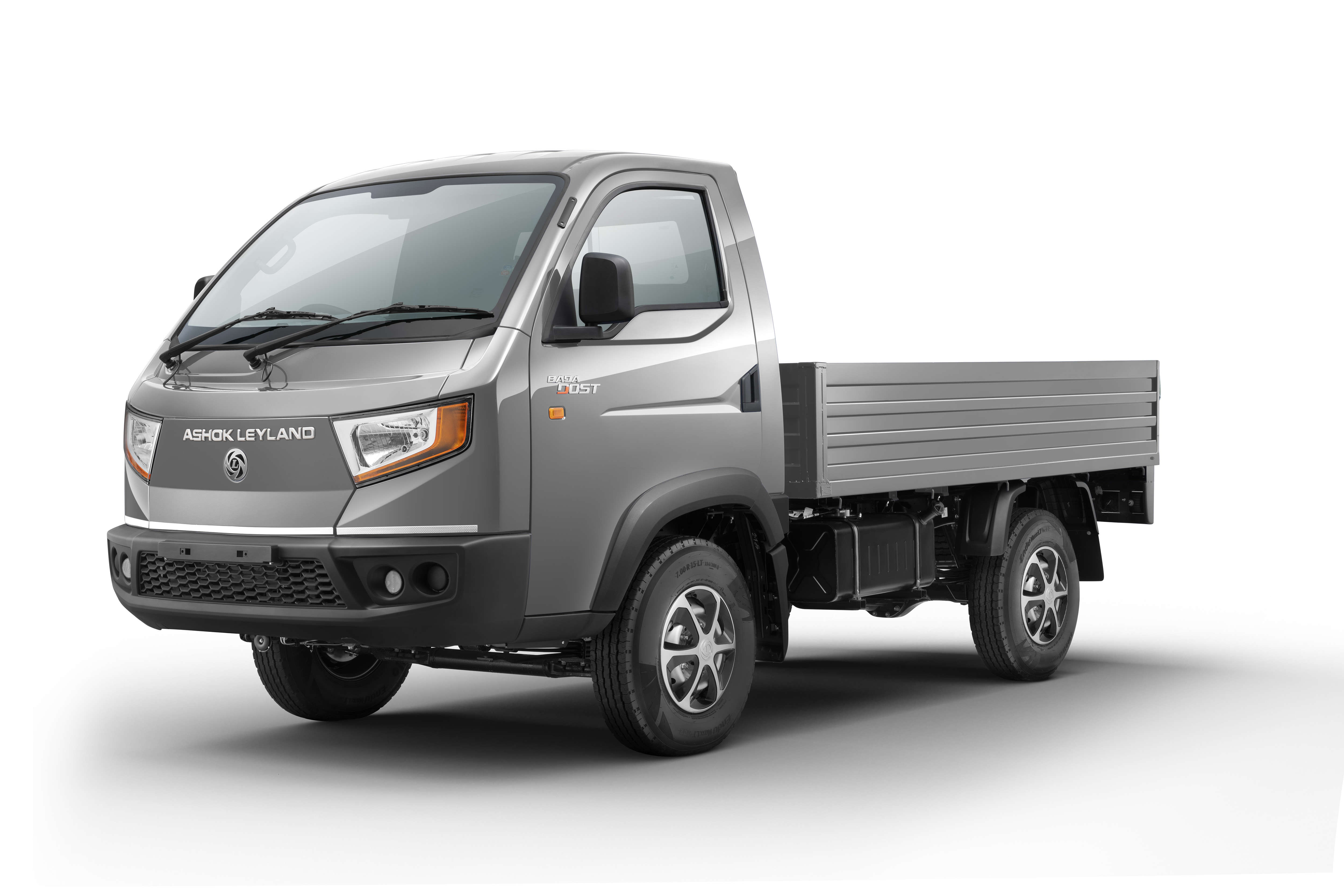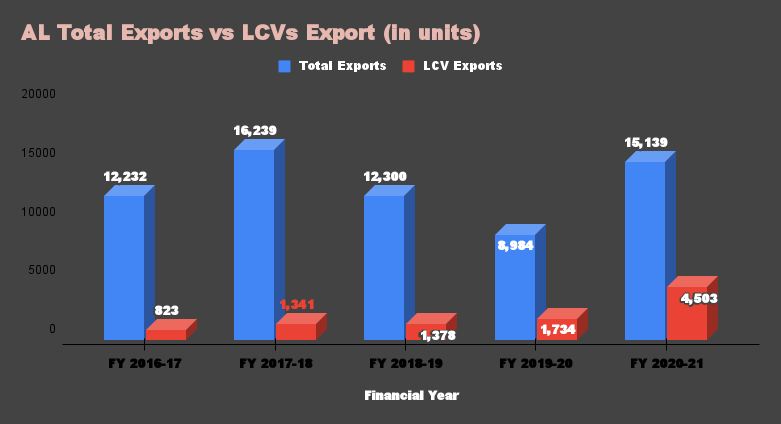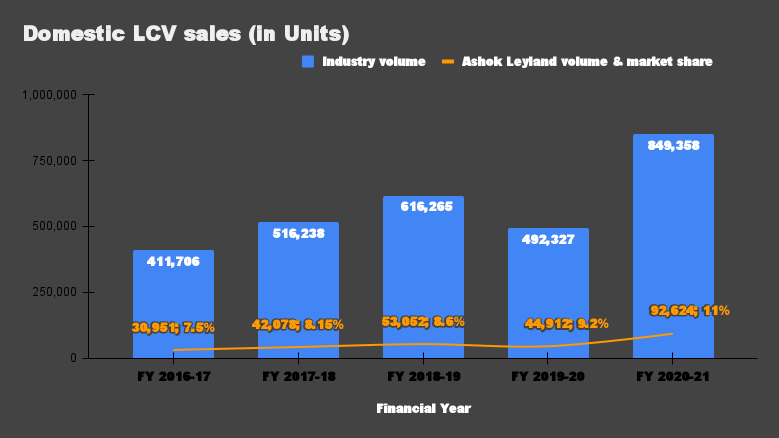
New Delhi: Ashok Leyland Ltd, India’s second largest commercial vehicle manufacturer, will expand its export basket of light commercial vehicles (LCV) in the near term on the strength of the new product launches on its Phoenix platform, a senior company executive said.
“The Phoenix platform, within the range it operates, will throw up more and more variants within the next quarters and therefore we will be expanding our presence within this platform. On top of that, we will obviously be looking at participating more in the LCV segment business overall because of the tremendous confidence we have in our products and the market share gains we had,” Vipin Sondhi, managing director and chief executive officer, Ashok Leyland, said.
The Chennai-based company has redrawn its export strategy with a larger product portfolio for its global customers than five years ago. With its vast range of products in both the left hand and the right hand drive, the company is targeting West Asia and Africa to expand the footprint of its LCVs and the newly-developed AVTR trucks. Launched in March 2020, AVTR is a new modular truck range that comes with i-Gen6 BS-IV technology.
Our entire export strategy is to access some of the addressable markets first with the LCVs and then penetrate it further with ICVs and M&HCVsGopal Mahadevan, Chief Financial Officer, Ashok leyland
“Our entire export strategy is to access some of the addressable markets first with the LCVs and then penetrate it further with ICVs and M&HCVs. This is because the radius of service for LCVs is limited as they are mostly intra-city and are easy to launch and maintain the sales and service network. Once the brand is established, we can quickly scale up to the ICV business and then move on to M&HCV,” Chief Financial Officer (CFO) of Ashok Leyland Gopal Mahadevan said on a call on Friday with analysts.
The LCV initiative is crucial from the international business perspective and the company will continue to fill in the white spots within this segment with new products, he said.
The new drive will help the company consolidate its position in the LCV segment, while continuing the focus on medium and heavy commercial vehicles (M&HCVs), Mahadevan said.
LCVs have been very resilient to the double jolts of Covid-19, and contributed to over 50% of Ashok Leyland’s total annual vehicle sales in FY21 compared to 28% in FY19.
While Ashok Leyland’s overall exports grew over 1.5 times in FY21 to 15,139 units year-on-year, the company’s LCV exports rose almost three times to 4,503 units.
The share of LCVs in the company’s overall exports increased five-fold to 30% from 6% over the past five years driven by new product introduction in the sub-5 tonne category including Dost Plus and Bada Dost.
More launches on Phoenix platform
As the commercial vehicle industry is crippled by the pandemic-induced lockdowns, Ashok Leyland is banking on its indigenously-developed LCV platform Phoenix to enhance its domestic market share from the present 11%. The new platform will allow the company to cater to both the right-hand and the left-hand drive markets across the globe.
In September 2020, the company launched its first LCV range on this platform called Bada Dost in two variants – i4 and i3 in 3-3.5 tonne gross vehicle weight (GVW) categories with a starting price of INR7.75 lakh. With Bada Dost the company, which currently holds 11% market share in the LCV category, is eyeing to double its addressable market to 65% from the present 34% in the next three years.
Even in these tough times the LCV space is getting significant demand traction from e-commerce and grocery transportation segments. Being the only segment in the commercial vehicle space which is showing growth, the company’s LCV segment will see multiple new launches from the Phoenix platform in the coming months.
The Society of Indian Automobile Manufacturers (SIAM) data shows that the CV maker has recorded steep growth in the LCV segment despite the ongoing slump in the domestic market. In FY21, it recorded 106% y-o-y growth to 92,624 units, against the single digit growth to 76,528 units in the wholesale volumes of its M&HCVs due to the delayed replacement cycle and slowdown in freight movement.
FY22 Capex
The Hinduja Group flagship company has lined up a Capex plan of about INR 750 crore for the current fiscal which will largely be spent on maintenance and debottlenecking on the LCV side. According to the senior management, the company is not looking for any brownfield or greenfield expansion this year.
With the gradual re-opening of the economy and cyclical upturn the CV segment is expected to see improved sales in the coming quarters. Experts say that Ashok Leyland has used the downcycle as an opportunity to remodel its portfolio towards next-gen platforms with the launch of a unique AVTR platform for trucks.
“The CV sector has been in a down cycle since FY18 and Ashok Leyland, with about 60%-70% revenue contribution from M&HCVs, is likely to benefit from the upcoming demand up cycle. The government’s infrastructure push along with strong demand from the mining sector is expected to drive HCV demand. The company’s AVTR platform would bring a superior cost structure with enhanced customer flexibility,” a recent note from ICICI Securities said.
















